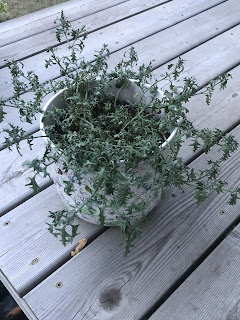It all started early this summer when I was preparing to plant my flowers. Gerber daisies are traditionally added to an old washtub. As I started adding some new soil to the leftover dirt from last year, I spotted a small starter plant with leaves similar in shape to the Gerber daisies. Could it be a small plant sprouted from last year's seed? Not knowing for sure, I dug it out and placed it in a separate pot of its own to watch.
As the plant grew, I could tell it probably wasn't a Gerber daisy. The color wasn't quite the same, and the leaves weren't getting big enough. But what was it? A friend had an app on her phone that would identify plants by simply taking a picture of them. According to the results, I had some kind of tomato plant on my hands. . .it even started producing little round fruit, and I was leaning towards it perhaps being a cherry tomato plant. I transplanted it into a bigger pot, and continued to faithfully tend it, making sure it had both sunshine and water to help it grow. It still puzzled me how a tomato seed had turned up in my flowers, since I have never grown tomatoes in the past.
Then something interesting happened. I was weeding my watermelon patch, and came across the same type of plant. Something told me there was perhaps a weed with similarity to a tomato plant, and to Google I went. It turns out there is something called a Solanum carolinense. According to Wikipedia, it also goes by other more common names, such as radical weed, sand brier, bull nettle, devil's tomato and wild tomato. It also informed me all parts of the plant, including the fruit, are poisonous to varying degrees. Effects of ingesting the plant include fever, headache scratchy throat, nausea, vomiting, and diarrhea. Had I continued to tend those cute little fruits it was producing, eating them could cause abdominal pain, circulatory and respiratory depression, or even death. Sure enough, I had been nurturing a weed!
Now, as I look at this carefully tended plant, I shake my head and wonder why I didn't recognize it as a weed. Perhaps it is because satan is very crafty in his deceitful ways, and even in plant life has invaded our world with things to lead us astray. As I pondered this, my thoughts went to a passage in Ephesians 5. Verses 22 and 23 is a very familiar list of spiritual fruit: love, joy, peace, patience, kindness, goodness, faithfulness, gentleness, and self-control. The verses following tell us those who belong to Christ Jesus have gotten rid of their sinful nature, and have replaced it with this new fruit of the Spirit.
So, what is the sinful nature comprised of? Backing up to verse 19, there is another list with a different kind of so-called "fruit" which gets displayed by someone acting under the control of their sinful nature. The list consists of sexual immorality, impurity and debauchery; idolatry and witchcraft; hatred, discord, jealousy, fits of rage, selfish ambition, dissensions, factions, and envy; drunkenness, orgies "and the like". It seems this list is longer, and filled with some unpleasant things. The worst is, verse 21 ends by saying those who live like this will not inherit the kingdom of God.
Your challenge this week is to make an honest evaluation of your life. Which list best describes the way you are living? Or, in the analogy of my careful attention to the wrong type of plant, are you producing good fruit, or simply tending weeds? As you ask God to help you, work on cultivating the good things listed as fruit of the Spirit, and work on eliminating the weeds of the sinful nature. Our world will be made better as you do!



No comments:
Post a Comment